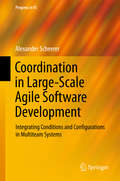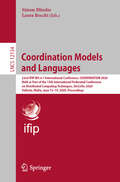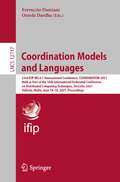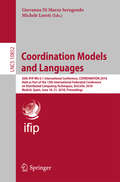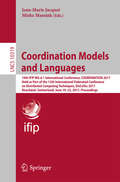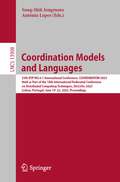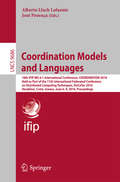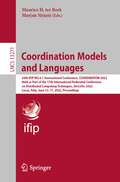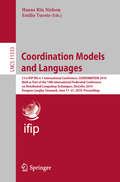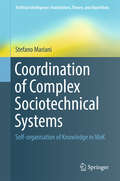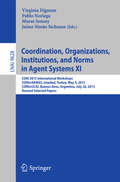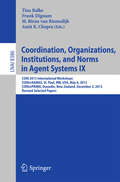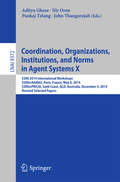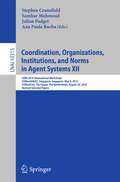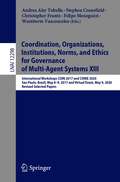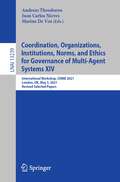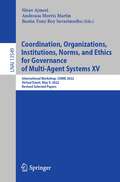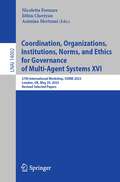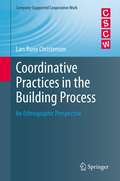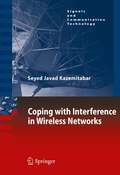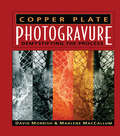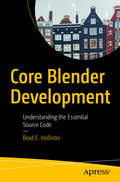- Table View
- List View
Coordination in Large-Scale Agile Software Development: Integrating Conditions and Configurations in Multiteam Systems (Progress in IS)
by Alexander ScheererThis book explores coordination within and between teams in the context of large-scale agile software development, providing readers a deeper understanding of how coordinated action between teams is achieved in multiteam systems. An exploratory multiple case study with five multiteam systems and a total of 66 interviewees from development teams at SAP SE is presented and analyzed. In addition, the book explores stereotypes of coordination in large-scale agile settings and shares new perspectives on integrating conditions for coordination. No previous study has researched this topic with a similar data set, consisting of insights from professional software development teams. As such, the book will be of interest to all researchers and practitioners whose work involves software product development across several teams.
Coordination Models and Languages: 22nd IFIP WG 6.1 International Conference, COORDINATION 2020, Held as Part of the 15th International Federated Conference on Distributed Computing Techniques, DisCoTec 2020, Valletta, Malta, June 15–19, 2020, Proceedings (Lecture Notes in Computer Science #12134)
by Simon Bliudze Laura BocchiThis book constitutes the proceedings of the 22nd International Conference on Coordination Models and Languages, COORDINATION 2020, which was due to be held in Valletta, Malta, in June 2020, as part of the 15th International Federated Conference on Distributed Computing Techniques, DisCoTec 2020. The conference was held virtually due to the COVID-19 pandemic.The 12 full papers and 6 short papers included in this volume were carefully reviewed and selected from 30 submissions. They are presented in this volume together with 2 invited tutorials and 4 tool papers. The papers are organized in the following topical sections: tutorials; coordination languages; message-based communication; communications: types & implementations; service-oriented computing; large-scale decentralized systems; smart contracts; modelling; verification & analysis.
Coordination Models and Languages: 23rd IFIP WG 6.1 International Conference, COORDINATION 2021, Held as Part of the 16th International Federated Conference on Distributed Computing Techniques, DisCoTec 2021, Valletta, Malta, June 14–18, 2021, Proceedings (Lecture Notes in Computer Science #12717)
by Ferruccio Damiani Ornela DardhaThis book constitutes the refereed proceedings of the 23rd IFIP WG 6.1 International Conference on Coordination Models and Language, COORDINATION 2021, held in Valletta, Malta, in June 2021, as part of the 16th International Federated Conference on Distributed Computing Techniques, DisCoTec 2021.The 15 regular papers, 2 short papers, and 1 tutorial paper presented in this book were carefully reviewed and selected from 31 submissions. COORDINATION provides a well-established forum for the growing community of researchers interested in coordination models and languages, architectures, verification and implementation techniques necessary to cope with the complexity induced by the demands of today's software development. The tool papers describe experience reports, technological artefacts, and innovative prototypes, as well as educational tools in the scope of the research topics of the conference. Due to the Corona pandemic this event was held virtually.
Coordination Models and Languages: 20th IFIP WG 6.1 International Conference, COORDINATION 2018, Held as Part of the 13th International Federated Conference on Distributed Computing Techniques, DisCoTec 2018, Madrid, Spain, June 18-21, 2018. Proceedings (Lecture Notes in Computer Science #10852)
by Giovanna Di Marzo Serugendo Michele LoretiThis book constitutes the proceedings of the 20th International Conference on Coordination Models and Languages, COORDINATION 2018, held in Madrid, Spain, in June 2018, as part of the 13th International Federated Conference on Distributed Computing Techniques, DisCoTec 2018.The 12 full papers included in this volume were carefully reviewed and selected from 26 submissions. The papers cover a wide range of topics and techniques related to system coordination, including: actor-based coordination, tuple- based coordination, agent-oriented techniques, constraints- based coordination, and finally coordination based on shared spaces.
Coordination Models and Languages: 19th IFIP WG 6.1 International Conference, COORDINATION 2017, Held as Part of the 12th International Federated Conference on Distributed Computing Techniques, DisCoTec 2017, Neuchâtel, Switzerland, June 19-22, 2017, Proceedings (Lecture Notes in Computer Science #10319)
by Jean-Marie Jacquet Mieke MassinkModern information systems rely increasingly on combining concurrent, d- tributed, mobile, recon?gurable and heterogenous components. New models, architectures, languages, and veri?cation techniques are therefore necessary to cope with the complexity induced by the demands of today's software devel- ment. Coordination languages have emerged as a successful approach, providing abstractions that cleanly separate behavior from communication and therefore increasing modularity, simplifying reasoning, and ultimately enhancing software development. This volume contains the proceedings of the 7th International Conference on Coordination Models and Languages (Coordination 2005), held at the Ins- tute of Informatics of the University of Namur, Belgium, on April 20-23, 2005. The previous conferences in this series took place in Cesena (Italy), Berlin (G- many), Amsterdam(TheNetherlands), Limassol(Cyprus), York(UK), andPisa (Italy). Building upon the success of these events, Coordination 2005 provided a forum for the community of researchers interested in models, languages, and implementation techniques for coordination and component-based software, as well as applications that exploit them. The conference attracted 88 submissions from authors all over the world.
Coordination Models and Languages: 25th IFIP WG 6.1 International Conference, COORDINATION 2023, Held as Part of the 18th International Federated Conference on Distributed Computing Techniques, DisCoTec 2023, Lisbon, Portugal, June 19–23, 2023, Proceedings (Lecture Notes in Computer Science #13908)
by Sung-Shik Jongmans Antónia LopesThis book constitutes the refereed proceedings of the 25th IFIP WG 6.1 International Conference on Coordination Models and Language, COORDINATION 2023, held in Lisbon, Portugal, in June 2023, as part of the 18th International Federated Conference on Distributed Computing Techniques, DisCoTec 2023. The 12 regular papers and 2 short paper presented in this book were carefully reviewed and selected from 27 submissions.The papers deal with the following topics: Collective Adaptive Systems and Aggregate Computing; Cyber-Physical Systems; Verification and Testing; Languages and Processes; and Run-Time Changes.
Coordination Models and Languages: 18th IFIP WG 6.1 International Conference, COORDINATION 2016, Held as Part of the 11th International Federated Conference on Distributed Computing Techniques, DisCoTec 2016, Heraklion, Crete, Greece, June 6-9, 2016, Proceedings (Lecture Notes in Computer Science #9686)
by Alberto Lluch Lafuente José ProençaThis book constitutes the proceedings of the 18th International Conference on Coordination Models and Languages, COORDINATION 2016, held in Heraklion, Crete, Greece, in June 2016, as part of the 11th International Federated Conference on Distributed Computing Techniques, DisCoTec 2016. The 16 full papers included in this volume were carefully reviewed and selected from 44 submissions. The papers cover a wide range of topics and techniques related to system coordination, including: programming and communication abstractions; communication protocols and behavioural types; actors and concurrent objects; tuple spaces; games, interfaces and contracts; information flow policies and dissemination techniques; and probabilistic models and formal verification.
Coordination Models and Languages: 24th IFIP WG 6.1 International Conference, COORDINATION 2022, Held as Part of the 17th International Federated Conference on Distributed Computing Techniques, DisCoTec 2022, Lucca, Italy, June 13-17, 2022, Proceedings (Lecture Notes in Computer Science #13271)
by Maurice H. ter Beek Marjan SirjaniThis book constitutes the refereed proceedings of the 24th IFIP WG 6.1 International Conference on Coordination Models and Language, COORDINATION 2022, held in Lucca, Italy, in June 2022, as part of the 17th International Federated Conference on Distributed Computing Techniques, DisCoTec 2022. The 11 regular papers and one short paper presented in this book were carefully reviewed and selected from 22 submissions. COORDINATION provides a well-established forum for the growing community of researchers interested in coordination models and languages, architectures, verification and implementation techniques necessary to cope with the complexity induced by the demands of today's software development.
Coordination Models and Languages: 21st IFIP WG 6.1 International Conference, COORDINATION 2019, Held as Part of the 14th International Federated Conference on Distributed Computing Techniques, DisCoTec 2019, Kongens Lyngby, Denmark, June 17–21, 2019, Proceedings (Lecture Notes in Computer Science #11533)
by Hanne Riis Nielson Emilio TuostoThis book constitutes the proceedings of the 21th International Conference on Coordination Models and Languages, COORDINATION 2019, held in Kongens Lyngby, Denmark, in June 2019, as part of the 14th International Federated Conference on Distributed Computing Techniques, DisCoTec 2019. The 15 full papers included in this volume were carefully reviewed and selected from 25 submissions. The papers are organized in topical sections named: computational models; tools; exploring new frontiers; and coordination patterns.
Coordination of Complex Sociotechnical Systems: Self-organisation of Knowledge in MoK (Artificial Intelligence: Foundations, Theory, and Algorithms)
by Stefano MarianiThe book discusses the main issues of coordination in complex sociotechnical systems, covering distributed, self-organising, and pervasive systems. A chemistry-inspired model of coordination, a situated architecture and coordination language, and a cognitive model of interaction are the ingredients of the Molecules of Knowledge (MoK) model for self-organisation of knowledge presented in this book. The MoK technology is discussed, along with some case studies in the fields of collaborative systems, academic research, and citizen journalism. The target audience includes researchers and practitioners in the field of complex software systems engineering. The book is also appropriate for graduate and late undergraduate students in computer science and engineering.
Coordination, Organizations, Institutions, and Normes in Agent Systems XI: COIN 2015 International Workshops, COIN@AAMAS, Istanbul, Turkey, May 4, 2015, COIN@IJCAI, Buenos Aires, Argentina, July 26, 2015, Revised Selected Papers (Lecture Notes in Computer Science #9628)
by Virginia Dignum Pablo Noriega Murat Sensoy Jaime Simão Simão SichmanThis book constitutes the thoroughly refereed post-conference proceedings of the 11th International Workshops on Coordination, Organizations, Institutions and Norms in Agent Systems, COIN 2015. The workshops were co-located with AAMAS 2015, held in Istanbul, Turkey, in May 2015, and with IJCAI 2015, held in Buenos Aires, Argentina, in July 2015. The 23 full papers were carefully reviewed and selected from 46 initial submissions for inclusion in this volume. The papers cover a wide range of topics from work on formal aspects of normative and team based systems, to software engineering with organizational concepts, to applications of COIN based systems, and to philosophical issues surrounding socio-technical systems. They highlight not only the richness of existing work in the field, but also point out the challenges and exciting research that remains to be done in the area.
Coordination, Organizations, Institutions, and Norms in Agent Systems IX: COIN 2013 International Workshops, COIN@AAMAS, St. Paul, MN, USA, May 6, 2013, COIN@PRIMA, Dunedin, New Zealand, December 3, 2013, Revised Selected Papers (Lecture Notes in Computer Science #8386)
by Tina Balke, Frank Dignum, M. Birna Riemsdijk and Amit K. ChopraThis book constitutes the thoroughly refereed proceedings of the 9th International Workshops on Coordination, Organizations, Institutions and Norms in Agent Systems, COIN 2013. The workshops were co-located with AAMAS 2013, held in St. Paul, MN, USA in May 2013, and with PRIMA 2013, held in Dunedin, New Zealand, in December 2013. The 18 full papers were carefully reviewed and selected from 28 submissions and are presented together with two invited papers. The papers are organized in topical sections such as coordination, organizations, institutions, norms, norm conflict, and norm-aware agents.
Coordination, Organizations, Institutions, and Norms in Agent Systems X: COIN 2014 International Workshops, COIN@AAMAS, Paris, France, May 6, 2014, COIN@PRICAI, Gold Coast, QLD, Australia, December 4, 2014, Revised Selected Papers (Lecture Notes in Computer Science #9372)
by Aditya Ghose Nir Oren Pankaj Telang John ThangarajahThis book constitutes the thoroughly refereed post-conference proceedings of the 10th International Workshops on Coordination, Organizations, Institutions and Norms in Agent Systems, COIN 2014. The workshops were co-located with AAMAS 2014, held in Paris, France, in May 2014, and with PRICAI 2014, held in Gold Coast, QLD, Australia, in December 2014. The 16 full papers were carefully reviewed and selected for inclusion in this volume. The papers cover a wide range of topics from work on formal aspects of normative and team based systems, to software engineering with organisational concepts, to applications of COIN based systems, and to philosophical issues surrounding socio-technical systems. They highlight not only the richness of existing work in the field, but also point out the challenges and exciting research that remains to be done in the area.
Coordination, Organizations, Institutions, and Norms in Agent Systems XII: COIN 2016 International Workshops, COIN@AAMAS, Singapore, Singapore, May 9, 2016, COIN@ECAI, The Hague, The Netherlands, August 30, 2016, Revised Selected Papers (Lecture Notes in Computer Science #10315)
by Julian Padget Ana Paula Rocha Stephen Cranefield Samhar MahmoudThis book constitutes the thoroughly refereed post-conference proceedings of the 12th International Workshops on Coordination, Organizations, Institutions and Norms in Agent Systems, COIN 2016. The workshop COIN@AAMAS 2016 was held in Singapore, Singapore, in May 2016, and the workshop COIN@ECAI 2016 was held in The Hague, The Netherlands, in August 2016. The 9 full papers were carefully reviewed and selected from 15 submissions for inclusion in this volume. They cover the following topics:Social Issues: The papers focus on the security of personal data, support for self-care for individuals with chronic conditions, analysis of the risk of information leakage in social networks, and an analysis of issues arising in the design of on-line environments whose participants are human and software. Teams: The papers consider different aspects of team working: what kinds of knowledge sharing best contribute to effective team performance and how to organize a tea m to function effectively in different kinds of scenarios. Rights and Values: The papers examine complementary issues that influence the effective design of normative systems, namely how to detect opportunism so that it may be discouraged, how individuals values influence (collective) decision-making processes and how rights and powers relate to value and conflict resolution in nested organizational structures.
Coordination, Organizations, Institutions, Norms, and Ethics for Governance of Multi-Agent Systems XIII: International Workshops COIN 2017 and COINE 2020, Sao Paulo, Brazil, May 8-9, 2017 and Virtual Event, May 9, 2020, Revised Selected Papers (Lecture Notes in Computer Science #12298)
by Andrea Aler Tubella Stephen Cranefield Christopher Frantz Felipe Meneguzzi Wamberto VasconcelosThis book constitutes the thoroughly refereed post-conference proceedings of the International Workshop on Coordination, Organizations, Institutions, and Norms for Governance of Multi-Agent Systems, COIN 2017, co-located with AAMAS 2017, and the International Workshop on Coordination, Organizations, Institutions, Norms and Ethics for Governance of Multi-Agent Systems, COINE 2020, co-located with AAMAS 2020. The COIN 2017 workshop was held in Sao Paulo, Brazil, in May 2017 and the COINE 2020 workshop was held virtually, in May 2020. The 9 full papers and 1 short paper were carefully reviewed and selected from a total of 20 submissions for inclusion in this volume and cover the following topics: empirical applications of COINE technologies; emergence and social metrics; and conceptual frameworks and architectures.
Coordination, Organizations, Institutions, Norms, and Ethics for Governance of Multi-Agent Systems XIV: International Workshop, COINE 2021, London, UK, May 3, 2021, Revised Selected Papers (Lecture Notes in Computer Science #13239)
by Andreas Theodorou Juan Carlos Nieves Marina De VosThis book constitutes revised selected papers from the thoroughly refereed proceedings of the International Workshop on Coordination, Organizations, Institutions, Norms, and Ethics for Governance of Multi-Agent Systems XIV, COINE 2021, held in London, UK, May 3, 2021. The 9 full papers included in this book were carefully reviewed and selected from 12 submissions. They were organized in topical sections as follows: Invited talk; conceptual frameworks architectures for collaboration and coordination; and modelling and understanding social behaviour using COINE technologies.
Coordination, Organizations, Institutions, Norms, and Ethics for Governance of Multi-Agent Systems XV: International Workshop, COINE 2022, Virtual Event, May 9, 2022, Revised Selected Papers (Lecture Notes in Computer Science #13549)
by Nirav Ajmeri Andreasa Morris Martin Bastin Tony Roy SavarimuthuThis book constitutes the thoroughly refereed post-conference proceedings of the International Workshop on Coordination, Organizations, Institutions, and Norms for Governance of Multi-Agent Systems, COINE 2022, which was held in Auckland, New Zealand, on May 9, 2022.The 14 papers included in these proceedings were carefully reviewed and selected from 15 submissions. They deal with autonomous agents and multi-agent systems, focusing on the scientific and technological aspects of social coordination, organizational theory, artificial (electronic) institutions, and normative and ethical MAS.
Coordination, Organizations, Institutions, Norms, and Ethics for Governance of Multi-Agent Systems XVI: 27th International Workshop, COINE 2023, London, UK, May 29, 2023, Revised Selected Papers (Lecture Notes in Computer Science #14002)
by Nicoletta Fornara Jithin Cheriyan Asimina MertzaniThis book constitutes the refereed proceedings of the 27th International Workshop on Coordination, Organizations, Institutions, Norms, and Ethics for Governance of Multi-Agent Systems, COINE 2023, held in London, UK, on May 29, 2023 (co-located with 22nd International Conference on Autonomous Agents and Multi-Agent Systems (AAMAS)).This book contains 10 full papers which are the extended and revised versions of the papers accepted to the workshop.The papers were carefully reviewed and selected from 13 submissions. They are organized in topical sections as follows: Norms, Social contracts, Institutions, and Privacy; Studies on the notion of Value; and Argumentation and Conventions
Coordinative Practices in the Building Process: An Ethnographic Perspective (Computer Supported Cooperative Work)
by Lars Rune ChristensenCoordinative Practices in the Building Process: An Ethnographic Perspective presents the principles of the practice-oriented research programmes in the CSCW and HCI domains, explaining and examining the ideas and motivations behind basing technology design on ethnography. The focus throughout is on generating ethnographically informed accounts of the building process and discussing the concepts of cooperative work and coordinative practices in order to frame technology development. Lars Rune Christensen provides an invaluable resource for these communities in this book. Illustrated with real examples from the building process, he reports on the cooperative work and coordinative practices found, allowing readers to feel that they know, from the point of view of the people working in the building process, what it is like to coordinate and do this kind of cooperative work.
Coping with Interference in Wireless Networks (Signals and Communication Technology)
by Seyed Javad KazemitabarUnlike wired networks where transmitters have no effect on receivers other than their own, in wireless networks we are limited by interference. The traditional routing methods are not optimal any more when it comes to a wireless medium. The maximum data rate on each link depends not only on the power in that link but also on the transmitted power from adjacent links. That is why the problem of power optimal routing needs to be solved jointly with scheduling. This suggests a cross layer design method as opposed to traditional networking where the algorithm for each layer is designed separately. In Coping with Interference in Wireless Networks we introduce several methods engaging different layers of network to mitigate interference in a wireless network.
Copper Plate Photogravure: Demystifying the Process (Alternative Process Photography Ser.)
by David Morrish Marlene MacCallumCopper Plate Photogravure describes in comprehensive detail the technique of traditional copper plate photogravure as would be practiced by visual artists using normally available facilities and materials. Attention is paid to step-by-step guidance through the many stages of the process. A detailed manual of technique, Copper Plate Photogravure also offers the history of the medium and reference to past alternative methods of practice.Copper Plate Photogravure: Demystifying the Process is part of the current revitalization of one of the most satisfyingly beautiful image-making processes. The range of ink color and paper quality possibilities is endless. The potential for handwork and alteration of the copper plate provides yet another realm of expressive variation. The subject matter and the treatment are as variable and broad as photography itself. This book's purpose is to demystify and clarify what is a complex but altogether "do-able" photomechanical process using currently available materials. With Copper Plate Photogravure, you will learn how to:· produce a full-scale film positive from a photographic negative· sensitize the gravure tissue to prepare it for exposure to the positive · prepare the plate and develop the gelatin resist prior to etching· prepare the various strengths of etching solutions and etch the plate to achieve a full tonal scale· rework the plate using printmaking tools to correct flaws or to adjust the image for aesthetic reasons· use the appropriate printing inks, ink additives, quality papers, and printshop equipment to produce a high quality printA historical survey and appendices of detailed technical information, charts, and tables are included, as well as a list of suppliers and sources for the materials required, some of which are highly specialized. A comprehensive glossary introduces the non-photographer or non-printmaker to many of the terms particular to those fields and associated with this process.
Copyright Exceptions: The Digital Impact
by Robert Burrell Allison ColemanThis book was first published in 2005. Copyright 'exceptions' or 'users' rights' have become a highly controversial aspect of copyright law. Most recently, Member States of the European Union have been forced to amend their systems of exceptions so as to comply with the Information Society Directive. Taking the newly amended UK legislation as a case study, this book examines why copyright exceptions are necessary and the forces that have shaped the present legislative regime in the UK. It seeks to further our understanding of the exceptions by combining detailed doctrinal analysis with insights gained from a range of other sources. The principal argument of the book is that the UK's current system of 'permitted acts' is much too restrictive and hence is in urgent need of reform, but that paradoxically the Information Society Directive points the way towards a much more satisfactory approach.
Copywriting Third Edition: Successful writing for design, advertising and marketing
by Gyles Lingwood Mark ShawWriting copy is often assumed to be a natural talent. However, there are simple techniques you can employ to craft strong written content with ease. This revised edition teaches the art of writing great copy for digital media, branding, advertising, direct marketing, retailing, catalogues, company magazines and internal communications, and aspects of writing for social media are integrated throughout. There are also new interviews and case studies. Using a series of exercises and up-to-date illustrated examples of award-winning campaigns and communication, *Copywriting, Third Edition takes you through step-by-step processes that can help you to write content quickly and effectively.
Copywriting Third Edition: Successful writing for design, advertising and marketing
by Gyles Lingwood Mark ShawWriting copy is often assumed to be a natural talent. However, there are simple techniques you can employ to craft strong written content with ease. This revised edition teaches the art of writing great copy for digital media, branding, advertising, direct marketing, retailing, catalogues, company magazines and internal communications, and aspects of writing for social media are integrated throughout. There are also new interviews and case studies. Using a series of exercises and up-to-date illustrated examples of award-winning campaigns and communication, *Copywriting, Third Edition takes you through step-by-step processes that can help you to write content quickly and effectively.
Core Blender Development: Understanding the Essential Source Code
by Brad E. HollisterLearn the essential source code of Blender and its unique build system. This book provides the inner workings of the Blender C-based source code, and will be indispensable for those wanting to contribute to this important open-source project.Blender is an open-source 3D modeling and rendering software package used in the production of assets for animated projects, 3D printing, games, and even scientific visualization. This book goes in depth and discusses the primary modules related to the GUI and the geometric modeling work. You'll start by learning how to reverse engineer geometric operators, and from there move on to the main features of the source code and how to apply them. When done, you'll have the necessary foundation for exploration in other modules of the Blender source code. Lack of software engineering knowledge, such as experience with large cross-platform code base, remains insurmountable for many new developers. While the Blender site includes much useful information, it is not detailed enough. Core Blender Development breaks down the barriers to entry for open-source development in 3-D modeling. What You’ll LearnFind the code for various functions and editors in BlenderTrack down bugs, and contribute new functionality to the Blender code baseExamine the .blend file and how it stores Blender stateUnderstand the Blender core code base beyond the community website documentationReview the explicit code traces and source files of descriptions of the code baseWho This Book Is ForPrimarily for novice to intermediate level developers and programmers with an interest in Blender, graphics, and visualization, who likely don’t have experience of reverse engineering a large code base.
